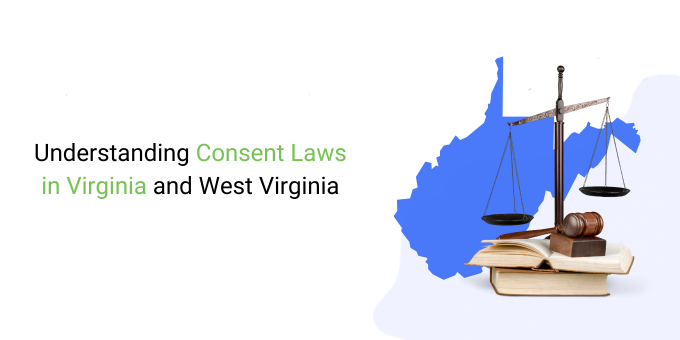Consent laws are crucial for defining the legal parameters of personal relationships and safeguarding individuals from exploitation. In Virginia and West Virginia, these laws establish clear boundaries, ensuring that relationships are both ethical and lawful. This article delves into the specifics of consent age laws in these states, their implications, and the importance of understanding these regulations.
What is the Consent Age in Virginia?
Virginia consent age is 18 years. This means individuals must be at least 18 years old to legally engage in consensual sexual activity. However, Virginia also has a “close-in-age” exception, commonly known as a Romeo and Juliet law, designed to prevent criminal charges against young individuals who engage in consensual relationships with peers close to their age.
For instance, this exception allows consensual relationships if one individual is 15 years old or older and the other is no more than three years older. However, this does not apply if the older individual is in a position of authority, such as a teacher or coach.
Violating the virginia consent age can lead to severe legal consequences, including charges of statutory rape, which can result in imprisonment and mandatory sex offender registration.
Related Article: Understanding the Age of Consent in Washington State
West Virginia Age of Consent
In West Virginia, the age of consent is 16 years. This is slightly lower than in Virginia and reflects the autonomy granted to younger individuals in the state. West Virginia also includes exceptions for close-in-age relationships, recognizing that consensual relationships between peers are fundamentally different from exploitative ones.
For example, a relationship where one individual is 14 or 15 years old, and the other is less than four years older, may not be subject to legal penalties. However, similar to Virginia, the presence of authority or a significant age gap can invalidate this exception.
The state’s laws are designed to protect minors while also respecting their developing autonomy. Violations of these laws can result in charges of sexual assault or abuse, carrying severe penalties, including prison sentences and long-term reputational damage.
Why Understanding Consent Laws is Essential
Understanding consent laws in Virginia and West Virginia is vital for various reasons:
- Protecting Minors from Exploitation:
These laws are in place to safeguard minors from predatory or coercive relationships. They create clear boundaries, ensuring young individuals are not pressured or manipulated into situations they cannot fully understand or consent to. - Preventing Legal Consequences:
Ignorance of the law is not a defense in court. Adults must understand these laws to avoid engaging in illegal relationships that could lead to severe legal and personal consequences. - Promoting Healthy Relationships:
By setting clear age limits and exceptions, these laws encourage relationships based on mutual respect and equal standing, fostering a healthier society.
Legal Consequences of Violating Consent Laws
Violating consent laws in Virginia or West Virginia can lead to serious legal repercussions, including charges such as statutory rape or sexual assault. The severity of these charges depends on factors such as:
- The ages of the individuals involved.
- The presence of coercion or authority.
- The nature of the relationship.
In Virginia, statutory rape involving a minor under 18 can result in felony charges, with potential prison sentences ranging from 1 to 20 years, depending on the circumstances. In West Virginia, similar violations can lead to sentences of up to 15 years and mandatory registration as a sex offender.
These penalties underscore the importance of adhering to consent laws to avoid life-altering consequences.
Key Differences Between Virginia and West Virginia Consent Laws
While Virginia and West Virginia share many similarities in their approach to protecting minors, their laws differ in significant ways:
- Age of Consent:
Virginia’s age of consent is higher at 18, compared to West Virginia’s 16. This reflects differing state-level approaches to defining autonomy for young individuals. - Close-in-Age Exceptions:
Both states include provisions for close-in-age relationships, but the specifics vary. Understanding these nuances is crucial for individuals in relationships that may border on legal limits. - Penalties for Violations:
While both states impose severe penalties for violations, the exact charges and sentences differ. Individuals must familiarize themselves with these laws to avoid misunderstandings.
How These Laws Compare Nationally
The age of consent across the United States varies, typically ranging from 16 to 18 years. Virginia consent age is on the higher end, aligning with states like California and Florida, which also set the age at 18. West Virginia’s age of consent aligns with the majority of states, where 16 is the legal threshold.
This variation highlights the importance of understanding consent laws when traveling or forming relationships across state lines. Engaging in activities legal in one state but not in another can lead to complex legal challenges.
Resources for Learning More
For those seeking to understand consent laws in greater depth, the following resources can provide valuable insights:
- Virginia and West Virginia State Legislatures:
These official sites offer detailed legal texts outlining the laws and exceptions. - Local Legal Aid Organizations:
These groups provide guidance for individuals with specific questions or concerns about consent laws. - Educational Resources:
Many nonprofit organizations focus on educating the public about consent and healthy relationships, ensuring individuals are well-informed about their rights and responsibilities.
Conclusion
Consent laws in Virginia and West Virginia are essential for protecting minors and fostering respectful relationships. While Virginia sets the age of consent at 18, West Virginia allows consensual relationships starting at 16. Both states include provisions to safeguard against exploitation and recognize the complexity of close-in-age relationships.
Understanding these laws is critical for avoiding legal issues and ensuring all relationships are ethical and consensual. By staying informed, individuals can navigate personal connections responsibly, fostering a safer and more respectful community.

